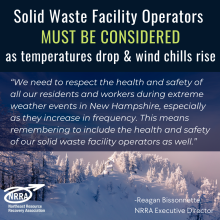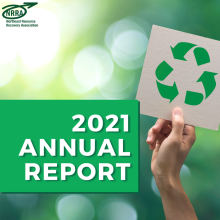Latest News

The second of three summits aimed at Increasing Construction and Demolition Debris Diversion in Coos County, NH was held earlier in March 2023. The project is funded in part by a EPA Healthy Communities grant . The first summit was held in December 2022 .
The NRRA Member Services team, along with NRRA's Executive Director, spent two days in Coos County presenting at the summit, and then taking part in tours of a local landfill and transfer station.
The second summit was open to Coos County Transfer Station operators and staff, selectmen, town administrators, Public Works staff, and so on. The goal was to share answers to several questions presented in the initial presentation and continue the discussion around increasing C&D diversion. It lasted for three hours and had a total of 21 attendees, which included EPA representative,...Read more

In the fall of 2022, NRRA launched a new project aimed at Increasing Construction and Demolition Debris Diversion in Coos County, NH. The project is funded in part by a EPA Healthy Communities grant , and the first of three summits was held in December 2022.
The NRRA Member Services team, along with our Executive Director, spent two days in Coos County presenting at the initial summit, and then taking part in site visits at two Coos County NRRA Member transfer stations.
The first summit was limited solely to transfer station operators and was focused on providing an initial presentation on C&D and then gathering information about current C&D diversion in Coos County. It lasted for three hours and had a total of 20 attendees, which included EPA representative, Christine Beling. With a total of 14 of 20 towns from Coos...Read more

These lightweight, durable and long-lasting gaylords are great for storing recyclables such as plastics, aluminum, and steel cans prior to baling.
They come with a lid, so they can be stacked, and are made of #5 polypropylene.
NRRA Cooperative Purchasing Gaylord Facts:
In January 2023, NRRA Members purchased 50 gaylords with lids Cost to Members was $217.99 each 2 of the 3 communities that purchased these gaylords applied for a grant through NH the Beautiful to cover the costsTestimonials:
“We purchased the gaylords to be used at the Tuftonboro Transfer Station as tools to assist us in our recycling efforts. We currently have one that...Read more

If your municipality markets their baled materials such as mixed paper and cardboard (also known in the industry as "fibers"), plastics, steel, and aluminum cans through NRRA, you may have noticed some fluctuation when it comes to pick up times, hauling fees, and pricing depending on the time of month that you request your baled material pickup.
For some, holding onto a recycling load any longer than absolutely necessary is more of a headache than it's worth - you may want it moved and an additional cost isn't an issue. For those who can wait, however, making the switch to sending loads in the beginning or middle of a month may make sense fiscally and logistically. Why? Because the last week-and-a-half of...Read more


Have you ever wondered what our Member Services team does? Made up of our Member Services Manager, Brian Patnoe, and Senior Member Services Representative, Bonnie Bethune, they have over 60+ years of recycling and solid waste management experience to pull from. Together, their department offers cooperative marketing and purchasing, along with ongoing technical assistance to member communities through email, phone, and in-person site visits. They put together member-only market updates, and answer common member inquiries such as recycling trends, proper processing techniques, or market specifications.
Recently, the Member Services team had great visits with the Gilmanton and New Durham Transfer Stations. Brian and Bonnie were impressed with both facilities!
“Gilmanton had some pretty cool repurposed items, which included a whole building,” noted Brian. He also scored a bag of chicken feed from the “Gilmanton Mall,” their version of a swap shop....Read more

In one North Country town, the transfer station facility manager asked to close for staff safety. The town’s leadership refused.
Meanwhile, the manager of a southern New Hampshire transfer station faced uncertainty about whether to close his facility. He wanted to close to keep his staff safe. However, if he did close, his part-time staff would not get paid.
At yet another transfer station, staff face the lack of a heated indoor space to warm up in between trips outside. Over the manager’s objections, it remains open on Saturday.
These are just three of the many stories I’ve heard recently from some of our state’s most essential workers: our solid waste facility operators who handle our trash and recycling, help...Read more


The Northeast Resource Recovery Association (NRRA) is pleased to announce the release of our 2021 Annual Report . The report is provided in a printable pdf format that makes it easy to share the value of recycling and NRRA membership with municipal staff, elected officials, and residents.
The report includes the following features:
Fiscal Year 2021 Revenue and Expense breakdown with easy to understand pie charts An overview of the full calendar year, including speaking engagements, articles, and virtual events NRRA hosted to keep recycling strong and our members connected through the Covid-19 pandemic Our Environmental Impact Report The amount NRRA was able to return to our member communities in 2021, thanks to recycling (and it's a BIG number) - scroll down to preview the image!Finally, we would be remiss if we didn’t acknowledge the impact of the COVID-19...Read more

Member Services Manager, Brian Patnoe, recently shared his thoughts on the current recycling markets:
How things change. Just a few months ago recycling was as strong as ever. Cardboard and paper were up, plastic was holding its own, and metals were good. But before you knew it, there was a drop. Interest rates increased, the housing market slowed, and people started to buy less.
The graph below represents our industry, and for many of us, our passion. It is the lifeline, the heartbeat.
At the peaks, our lives seem easier. The economy usually is strong and we can brag about how much money we have made and/or saved the town. It also seems to be easier to upgrade equipment when towns see the revenue that is passing through. But when prices - and revenues - are down, it usually means people don’t have extra money...Read more